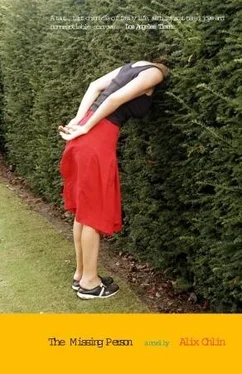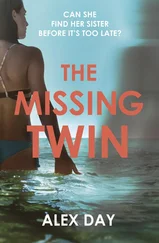“Okay,” he finally said, “let’s go back.”
“What? Wylie, come on.”
“I’m serious. Let’s keep going. We can do a country-club pool, maybe. We’ll break into the poolhouse and use their drainage system. It might take me a couple of minutes to figure it out, but it’ll drain faster than with the submersible pump, so that’s an advantage.” He was almost panting. “Listen, I understand it’s a suboptimal situation, but flexibility’s the key to our success.”
“Wylie,” I said, “no way.”
Irina, in the back, kept silent.
“There is absolutely no reason we can’t do this,” Wylie said. Instead of slouching, he was straight and serious now, making eye contact with each of us. “We can be in and out in five minutes, tops. Once I get it draining, we can leave. Really, we can do it.”
“No, we can’t,” I said. His expression told me that if I didn’t put it in his terms, he’d never speak to me again. “Wylie, the plan’s inherently flawed. We don’t know what their system’s like or even where it is. And instead of three other men you’ve got me, Irina, and a six-month-old baby. For a much larger pool. It’d be so much better to regroup and revise our tactics rather than risk everything for this.”
“She is actually seven months,” Irina corrected.
“Sorry,” I said.
“It’s okay, I am not offended.”
Wylie was looking down at the seat and smoothing the duct tape over a tear in the upholstery.
“There will be plenty of other opportunities,” I said. “But for tonight I say we retrench and, well, analyze the suboptimal nature of events. Then we can, you know, figure out how to do it better next time.”
We sat in the dark, the Caprice’s engine idling like a smoker’s cough, while Wylie thought it over. When he met my eyes again I was almost sure — not a hundred percent, but nonetheless — I saw a flash of gratitude.
“It could be that continuing tonight isn’t the most efficient use of our resources,” he said.
I smiled. “I think you’re right.”
Psyche cried relentlessly as we drove back to the apartment, which made conversation impossible. Wylie was slumped sideways against the door, and I could see him turning over the night’s events in his mind, evaluating and analyzing and formulating alternatives for the future. You could say this much about him: he was always thinking. Irina, her round face ducked close to the sling, shushed and sang to the baby, but to no avail. Above us, clouds skittered across the face of the moon.
For some reason, I thought of Harold Wallace drinking alone in his well-manicured, beige-and-white house, and then about my mother, wondering where she was and what she was doing.
It was almost three o’clock when we got to Wylie’s place. Irina disappeared into the back room with Psyche, who was still crying. Angus, Stan, and Berto were lying on the floor drinking beer by candlelight, looking sleepy and stoned. Angus smiled and gestured for me to come over, but I shook my head. Something about him was bothering me, starting with the way he’d laughed when things went wrong, as if none of this really mattered to him; it didn’t mean that much to me, either, but it did to the others, and he was, after all, one of them. He stared at me hard for a second, then shrugged and turned his attention to Wylie, who was pacing in a tight circle.
“That,” my brother said, “was a disaster.”
Stan nodded his head. “It was fairly hideous.”
“You got that right, man,” Berto said. “Maybe we should go back to the stuff everybody else is doing? Like the demonstrations and all that shit.”
“Fuck demonstrations,” Angus said, keeping his eyes on Wylie.
“No need for harsh language, man,” Berto said.
“Hey, if you want to start a letter-writing campaign, go right ahead,” Angus said, smiling at him.
“Unforgivably disastrous,” Wylie said, still pacing, and now clenching his hands into fists. “Completely fragmented. We’ve got to do a major overhaul of our planning process. This can’t happen again. It’s a waste of time and resources.”
“Listen, it was only an experiment,” Angus said. “We tried, and it didn’t work out. Next time we’ll do better.”
Stan and Berto looked back and forth, expectantly, between Angus and Wylie. I had a feeling they’d been witness to these debates before.
“You said we could be in and out in five minutes!” my brother snapped. “You said we could drain half the neighborhood in one night! But we only got through one, Angus. You’re the water-systems expert, you were supposed to deal with the logistics, and we only did one pool!”
“So it’s my fault?” Angus still didn’t look upset. He was just lying there, every once in a while drinking from his beer bottle. In the glow of the candles his hair looked darker than usual, its red turning to rust.
“I depended on your expertise,” Wylie said, “and it was a mistake.” He slowly lowered himself to the dusty floor and crossed his legs. “I won’t make that mistake again.”
“Hey, buddy,” Angus said. “It wasn’t that bad.”
“Don’t call me that,” Wylie said. “I’m not your buddy.”
“You sure as hell are, buddy.”
Angus was still smiling, which annoyed me, but my brother was seething. Watching the both of them, knowing they’d be up all night arguing, I sighed. “I’m going back to Mom’s,” I said then. “I feel bad. I haven’t seen her in ages. I don’t even know how she’s doing.”
“She’s fine,” Wylie said.
“Oh, how would you know?”
“Do you think I don’t go by to check on her?” His dark eyes were flashing. He was just as mad at me as he was at Angus, as he was at the rest of the world.
“I don’t know what to think about you, Wylie,” I said. “And you don’t exactly help me figure it out.”
He tapped his fingers on the floor and nodded in a tight staccato. “That must be tough for you,” he said.
I left them all behind, their floor squatting and arguments and plans, the baby still mewling in the bedroom. My mother didn’t wake up when I came in, and in her little guest room I crawled between soft clean sheets. I’d thought that it would feel like coming home. Nowhere else in the world promised that sensation — not Brooklyn, not cheap motel rooms or my brother’s apartment, certainly not Paris or the Upper West Side — but my last thoughts before sleep were uneasy. I wished I knew where else on earth I should have gone.
David Michaelson served me coffee. When I stumbled into the kitchen and saw him in a red-striped bathrobe, smiling at me, I realized I’d almost forgotten he existed.
My mother was sitting at the table with her coffee, her short hair unmussed by sleep. “Look what the cat dragged in,” she said in an even tone.
“I’ve been with Wylie,” I said, as if this excused everything, and took the cup from David’s large hand. After the relentless grunge of recent days my mother’s place seemed unbearably clean and orderly; I practically had to squint to look at it. Even the utensils sparkled alarmingly.
“How is old Wylie?” David set his own cup down on the table, sat down opposite me, and met my gaze without any sign of awkwardness. “I felt real bad about the way things ended last time. There’s no reason we can’t have a civil discussion about environmental issues. No reason at all.”
“David,” my mother said.
He smiled at her, pleasantly, then turned back to me, gesticulating in a lawyerly manner, his elbows on the table. “But if people just storm out every time there’s a disagreement, well, civility doesn’t stand a chance, now does it?” His reasonableness was making me queasy, or maybe it was the triangle of curly chest hair his bathrobe exposed when he leaned forward. I focused instead on my coffee, which was simultaneously bitter and enjoyable. It felt good to wake up and drink coffee in a normal cup, in a normal kitchen, with no hangover at all.
Читать дальше












